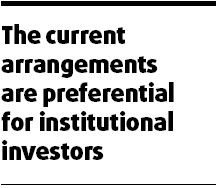Fairer playground needed for share bids
Updated: 2008-01-08 07:14
In a new report by the Chinese Academy of Social Sciences (CASS) on social development in 2008, researchers predicted that the ongoing price rises in living necessities and capital assets would significantly worsen the income differences among social groups. The report also pointed out that the biggest impact of price rises would be felt by low-income families in urban areas.
China Securities Regulatory Commission (CSRC), the country's stock market watchdog, held discussions recently to explore the reasons behind the heavy slump in PetroChina's stock prices shortly after it was listed on the A-share market on November 5.

What makes the discussion headline news, especially among the financial media, is that experts involved in the discussions believed the instant slump in the stock price of "the most profitable company throughout Asia" was caused by severe defects in the mechanism for issuing new stocks.
The two pieces of news are linked because both are closely related with the fair distribution of social wealth, an important issue in today's society.
In General Secretary Hu Jintao's report to the 17th National Congress of the Communist Party of China, he stressed that "conditions will be created to enable more citizens to have property income". The authorities were obviously focused on helping people grow their income at the same pace as the national economy through investment.
Only with reasonable income growth, could the lives of common people improve. This is an integrated part of the authorities' efforts to build a harmonious society in the country.
It should be a key consideration for the policymakers to stop the income gap from worsening and achieve a fair distribution of social wealth.
Of course, this goal is set to be challenged in reality.
The report by CASS suggested that rich people have access to more diversified investment tools, through which they can garner property revenue to cushion inflation pressure. But those with middle and low incomes do not enjoy the same opportunities or tools to overcome the shocks of price rises.
Therefore, the system design of the stock market, a barrier-free tool for individual investors in China now, bears a significance that is rarely mentioned in traditional financial theories: to maintain fairness in the distribution of social wealth.
When the A shares of PetroChina opened at 48.6 yuan ($6.50) in its debut on Shanghai Stock Exchange on November 5, the market was surprised by the price, which was almost three times that of the issue price.
Then, in the following trading days, the price kept dropping. Today its value is about 60 percent of its opening price.
The deep slump of PetroChina A-shares has caused a book loss of 200 billion yuan ($26.3 billion) for individual investors.
As it was pointed out during the CSRC discussion, this slump was caused by defects in the new shares issue system. The current arrangements are obviously more preferential for institutional investors and investors with large amounts of capital.
Institutional investors could buy new stocks in an offline bid specially targeted to them, and they are also allowed to buy new stocks through online applications along with individual investors.
And in the online competition for new stocks, institutional investors gain an upper hand over individual investors because of their abundant supply of capital.
Thus, the majority of the new stocks are likely to be snapped up by institutional investors, leaving individual investors to scramble for what is left on the secondary market.
With such advantages, institutional investors have an easy way to make quick money. They can arrange high-tuned reports about the expected high value of the new stocks before the stocks hit the market. Then, as long as the stock opens high, institutional investors are able to sell them off and pocket the lucrative profits.
This is exactly what happened in the case of the PetroChina A shares.
Before November 5, the shares were lauded as a stock really worth buying and holding in the long run. But on that day, an institutional investor sold about 80 million shares at a market value of 3.6 billion yuan ($473.7 million).
By sharp contrast, most individual investors have really limited opportunity to purchase the new stock. Thus, they also lost the chance of gaining any property income, in the short and long run, through PetroChina shares.
Admittedly, it is not in the working sphere of the government that better-off groups have more diversified investment opportunities and tools.
But if the system of new stock issuing, which should be fair and transparent, has worked in such a manner that it has worsened income gaps, the decision-makers should definitely attempt to find a solution.
There have been mature practices in Hong Kong to ensure such fairness. That could have a high value of reference for us if the authorities wanted to reform our current system.
Considering the fact that many of the State-owned enterprises (SOEs) are earmarked to be listed, it would certainly benefit the public if a new system was devised to allow common people to purchase the shares of these SOEs on a fair basis and enjoy the profits from the growth.
The author holds a doctorate in economics from the Shanghai Academy of Social Sciences
(China Daily 01/08/2008 page8)
|
|
|
|
|
|